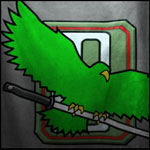

Quiaff, Quineg, and YOU!
Started by CanAm, Jul 02 2012 02:10 PM
48 replies to this topic
#41
Posted 02 July 2012 - 06:59 PM
#42
Posted 02 July 2012 - 07:20 PM
cool, cool.
#43
Posted 03 July 2012 - 12:49 AM
A very stimulating sparing match, quiaff?
Khan Terror
Clan Black Jackals
Khan Terror
Clan Black Jackals
#44
Posted 03 July 2012 - 02:26 AM
 CanAm, on 02 July 2012 - 02:58 PM, said:
CanAm, on 02 July 2012 - 02:58 PM, said:
Correct. It effectively takes a statement and turns it into a question that you already know the answer to, you just seek to have it affirmed.
indeed
 Geist Null, on 02 July 2012 - 04:56 PM, said:
Geist Null, on 02 July 2012 - 04:56 PM, said:
clans = grammer nazi's in space 
come on, that is below the belt, I have head it said somewhere else, that the Clans, are more a mix of authoritarian like regimes, and they take aspects of all, and are thus "unique" and cannot be compared to real life history / regimes
#46
Posted 03 July 2012 - 03:44 AM
That is what we said James because that is how they use it in the books. He said avoid using it that way. We pointed out the error. He said one thing then after a while, tried to flip what he said. Also it is used besides that.
Sure you can say,
"The sky is blue, quiaff?" You already know the answer, it is blatantly obvious.
but as I stated before in the example with the intelligence reports, you might believe things are one way & use the expression expecting one answer when it is in fact not so.
e.g. "The 16th Battle Cluster is still on Wotan, quiaff?" (the speaker believes that this unit is still on the planet mentioned. This may still be the case or the intel may be old & the unit may have moved on)
So again, the reply is not the issue, the words can be used once the speaker believes he should get either a positive or a negative reply, whether it is blatantly obvious (as they do in the books), or not.
I always argue with the source material to back me up. I would think that whatever someone says is trumped by what the people who created the universe says, quiaff?
Sure you can say,
"The sky is blue, quiaff?" You already know the answer, it is blatantly obvious.
but as I stated before in the example with the intelligence reports, you might believe things are one way & use the expression expecting one answer when it is in fact not so.
e.g. "The 16th Battle Cluster is still on Wotan, quiaff?" (the speaker believes that this unit is still on the planet mentioned. This may still be the case or the intel may be old & the unit may have moved on)
So again, the reply is not the issue, the words can be used once the speaker believes he should get either a positive or a negative reply, whether it is blatantly obvious (as they do in the books), or not.
I always argue with the source material to back me up. I would think that whatever someone says is trumped by what the people who created the universe says, quiaff?
Edited by Jaroth Winson, 03 July 2012 - 03:49 AM.
#47
Posted 03 July 2012 - 07:06 AM
 Jaroth Winson, on 03 July 2012 - 03:44 AM, said:
Jaroth Winson, on 03 July 2012 - 03:44 AM, said:
e.g. "The 16th Battle Cluster is still on Wotan, quiaff?" (the speaker believes that this unit is still on the planet mentioned. This may still be the case or the intel may be old & the unit may have moved on)
So again, the reply is not the issue, the words can be used once the speaker believes he should get either a positive or a negative reply, whether it is blatantly obvious (as they do in the books), or not.
So again, the reply is not the issue, the words can be used once the speaker believes he should get either a positive or a negative reply, whether it is blatantly obvious (as they do in the books), or not.
This is true. It has in fact been introduced to reduce the margin for error. It has evolved to be used in a rethorical way most of the time.
A language student of the scientist caste should be familiar with this, quiaff?
#48
Posted 03 July 2012 - 08:52 AM
Funny thread title.
#49
Posted 03 July 2012 - 11:49 AM
 Jaroth Winson, on 03 July 2012 - 03:44 AM, said:
Jaroth Winson, on 03 July 2012 - 03:44 AM, said:
I always argue with the source material to back me up. I would think that whatever someone says is trumped by what the people who created the universe says, quiaff?
Sure, I will bite.
The "source material" is written by a collection of authors, of course there is going to be varied use. Your uses of the word still fall under my categorical use.
You are (still) stuck on the fact that I said it should not be used for something blatantly obvious. If you will note, I said "should not", not "must not". Furthermore, if you just read point four again, and apply it to point three, you will see that something that is blatantly obvious could have implied meaning.
Once again, what would someone that works in the linguistic field know about language, constructs, and their uses?
1 user(s) are reading this topic
0 members, 1 guests, 0 anonymous users






















